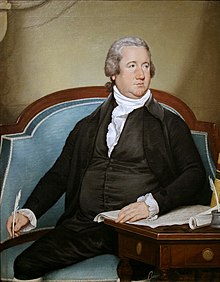米倫伯格傳說

米倫伯格傳說是在美國和德國流傳的一個都市傳說。這個傳說指美國第一位眾議院議長弗雷德里克·米倫伯格所投下的一票,使德語不能成為美國的官方語言。
傳說的基礎
[編輯]傳說背後的真實事件,是有一群德國移民要求將一些法律翻譯為德語,於是美國眾議院在1794年為此投了一次票。美國眾議院討論這項訴求後沒有得出決定,於是投票決定是否中止討論,留待日後繼續,結果為42對41,以一票之差被否決。當時並沒有表決任何的法案,僅僅投票是否休會待續。這項休會動議投票未能通過,此事也就擱置了。[1]就是這次唱名表決,衍生出「德語只差一票未能成為美國官方語言」的傳說。
本身為德國裔的米倫伯格沒有參與到這次投票當中。其後他被指說了一句話「德國人愈快成為美國人就愈好」。[2][3]
美國並無法定官方語言:英文出於其國家主流語言地位,成為事實上的使用語言。有些州在不同時間通過了各自的官方語言法案。[1]
歷史
[編輯]
這個傳說歷史悠久,並且導致了在1920年代後期直至1950年代初期出版了一些分析和文章,解釋這個故事為何是虛構的。[4][5][6][7]這個故事最晚在1940年代後期已被稱為「米倫伯格傳說」。[8]儘管如此,傳說仍然流傳。[9][10][11]
大多數的記述都將傳說的起源歸到弗朗茨·馮勒赫。他是曾到美國訪問的德國人,1847年出版著作Geschichte und Zustände der Deutschen in Amerika(德國人在美國的歷史和狀況)。[12]他似乎把這個關鍵投票的故事只設定在賓夕凡尼亞州,決定德語是否為該州的官方語言,而非美國全國。(當時美國國會座落在該州的費城,費城同時也是該州的首府。令事件更加混淆的是,米倫伯格在出任美國眾議院議長前,也曾經出任賓夕凡尼亞州眾議院的議長。)根據他的說法,投票結果打平,於是米倫伯格給英語投下決定性的一票。[13]
類似的傳言
[編輯]在中國也流傳着類似的傳言。網絡流傳西南官話、吳語、粵語以「一票之差」敗給北京話,差點當選為現代標準漢語。然而,北京話自清末以來在北京一直就是官方話,無論是中華民國還是中華人民共和國政府都從未以投票形式決定官方話。[14]投票傳言的來源之一是1913年(民國2年)2月15日由中華民國教育部國語統一籌備會舉行的讀音統一大會,會上以一省一票的機制對6500個字的「國音」進行投票審定,但並無將任何方言票選為國語的議程[15];另一來源則是1955年由中國科學院舉行的現代漢語規範問題學術會議,惟會上代表一致贊成將北京音定為官方音,亦沒有投票。
參見
[編輯]參考
[編輯]- ^ 1.0 1.1 German Almost Became Official Language. Snopes. [2018-05-05]. (原始內容存檔於2022-07-23).
- ^ Heath, Shirley Brice & Frederick Mandabach. Language Status Decisions and the Law in the United States, in Cobarrubias, Juan & Joshua A. Fishman, eds., Progress in Language Planning, p. 94 (1983)
- ^ Sick, Bastian (19 May 2004). German as the official language of the USA? (頁面存檔備份,存於網際網路檔案館), Spiegel Online (in English)
- ^ (18 February 1943). A German Language Rumor Traced Down (頁面存檔備份,存於網際網路檔案館), by W.L. Werner in American Speech magazine, reprinted in The Milwaukee Journal
- ^ Feer, Robert A. Official Use of the German Language in Pennsylvania (頁面存檔備份,存於網際網路檔案館), The Pennsylvania Magazine of History and Biography (Vol. 76, No. 4) (October 1952)
- ^ Arndt, Karl J. R. German as the Official Language of the United States of America?, Monatshefte, Vol. 68, No. 2 (Summer, 1976), pp. 129–150 (Arndt's article attempts to trace pre-Loher accounts which may have helped foster the legend, including an 1813 article by Justus Christian Henry Helmuth; at n. 21, Arndt lists seven accounts published between 1927–52 debunking the myth, starting with the 2nd edition of Albert Bernhardt Faust's The German Element in the United States, at Vol. II, pp. 652–56 (1927))
- ^ Lohr, Otto. Deutsch als 'Landessprache' der Vereinigten Staaten?, Mitteilungen der Akademie zur wissenschaftlichen Erforschung und zur Pflege des Deutschtums 4 (1931): 283–90 (in German)
- ^ Wood, Ralph C. The Second Period of the German Society of Pennsylvania and the Muhlenberg Legend, publication?, cited in The German American Review, 1949
- ^ (8 August 1981). Zepezauer, Frank S. When German almost became our language (頁面存檔備份,存於網際網路檔案館), Milwaukee Journal
- ^ Baron, Dennis (March 1996). watzmann.net: Urban Legend: German almost became the official language of the US (頁面存檔備份,存於網際網路檔案館), watzmann.net (reprinting 1996 essay by Dennis Baron, full account of the legend and its origin)
- ^ Adams, Willi Paul et al. Indiana University-Purdue: German or English? 網際網路檔案館的存檔,存檔日期2010-06-24., in The German-Americans: An Ethnic Experience (1993)
- ^ Loher, Franz. Geschichte und Zustände der Deutschen in Amerika (1847) (in German) via archive.org
- ^ Mencken, Henry L. The American Language: Supplement One, pp. 138–39 (1945)
- ^ 传言:四川话当年差一票当选普通话?. 四川在線. [2013-02-09]. (原始內容存檔於2021-02-17).
- ^ 民国初年——哪种方言“差一票”成为国语. 文摘報. [2013-02-09]. (原始內容存檔於2018-10-01).
